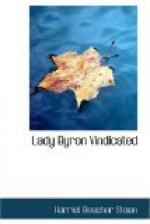CHAPTER II. THE ATTACK ON LADY BYRON.
In proving what I asserted in the first chapter, I make four points:
1st. A concerted attack upon Lady Byron’s reputation, begun by Lord Byron in self-defence.
2nd. That he transmitted his story to friends to be continued after his death.
3rd. That they did so continue it.
4th. That the accusations reached their climax over Lady Byron’s grave in ‘Blackwood’ of 1869, and the Guiccioli book, and that this re-opening of the controversy was my reason for speaking.
And first I shall adduce my proofs that Lady Byron’s reputation was, during the whole course of her husband’s life, the subject of a concentrated, artfully planned attack, commencing at the time of the separation and continuing during his life. By various documents carefully prepared, and used publicly or secretly as suited the case, he made converts of many honest men, some of whom were writers and men of letters, who put their talents at his service during his lifetime in exciting sympathy for him, and who, by his own request, felt bound to continue their defence of him after he was dead.
In order to consider the force and significance of the documents I shall cite, we are to bring to our view just the issues Lord Byron had to meet, both at the time of the separation and for a long time after.
In Byron’s ‘Memoirs,’ Vol. IV. Letter 350, under date December 10, 1819, nearly four years after the separation, he writes to Murray in a state of great excitement on account of an article in ‘Blackwood,’ in which his conduct towards his wife had been sternly and justly commented on, and which he supposed to have been written by Wilson, of the ’Noctes Ambrosianae.’ He says in this letter: ’I like and admire W—–n, and he should not have indulged himself in such outrageous license. . . . . When he talks of Lady Byron’s business he talks of what he knows nothing about; and you may tell him no man can desire a public investigation of that affair more than I do.’ {7}
He shortly after wrote and sent to Murray a pamphlet for publication, which was printed, but not generally circulated till some time afterwards. Though more than three years had elapsed since the separation, the current against him at this time was so strong in England that his friends thought it best, at first, to use this article of Lord Byron’s discreetly with influential persons rather than to give it to the public.




